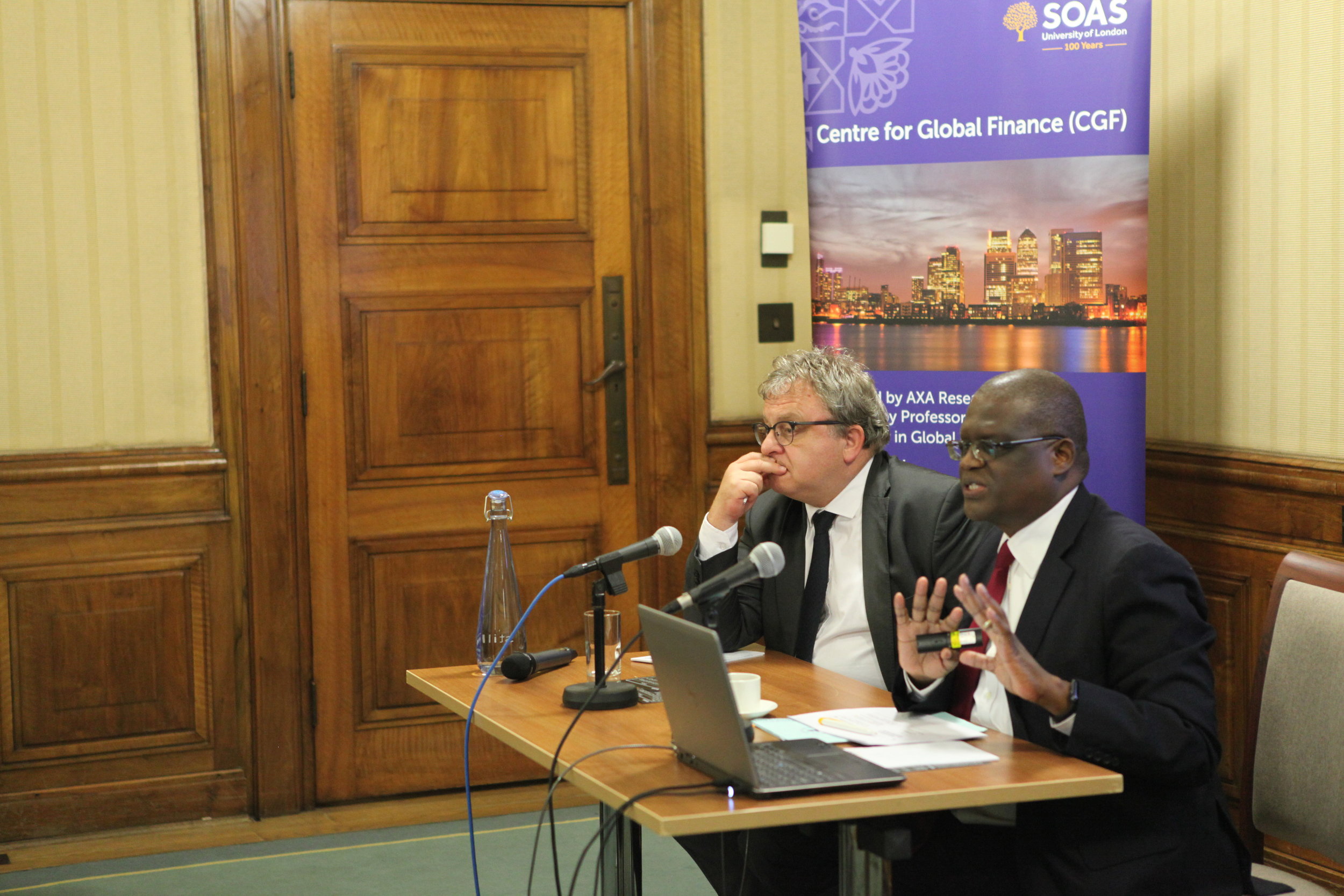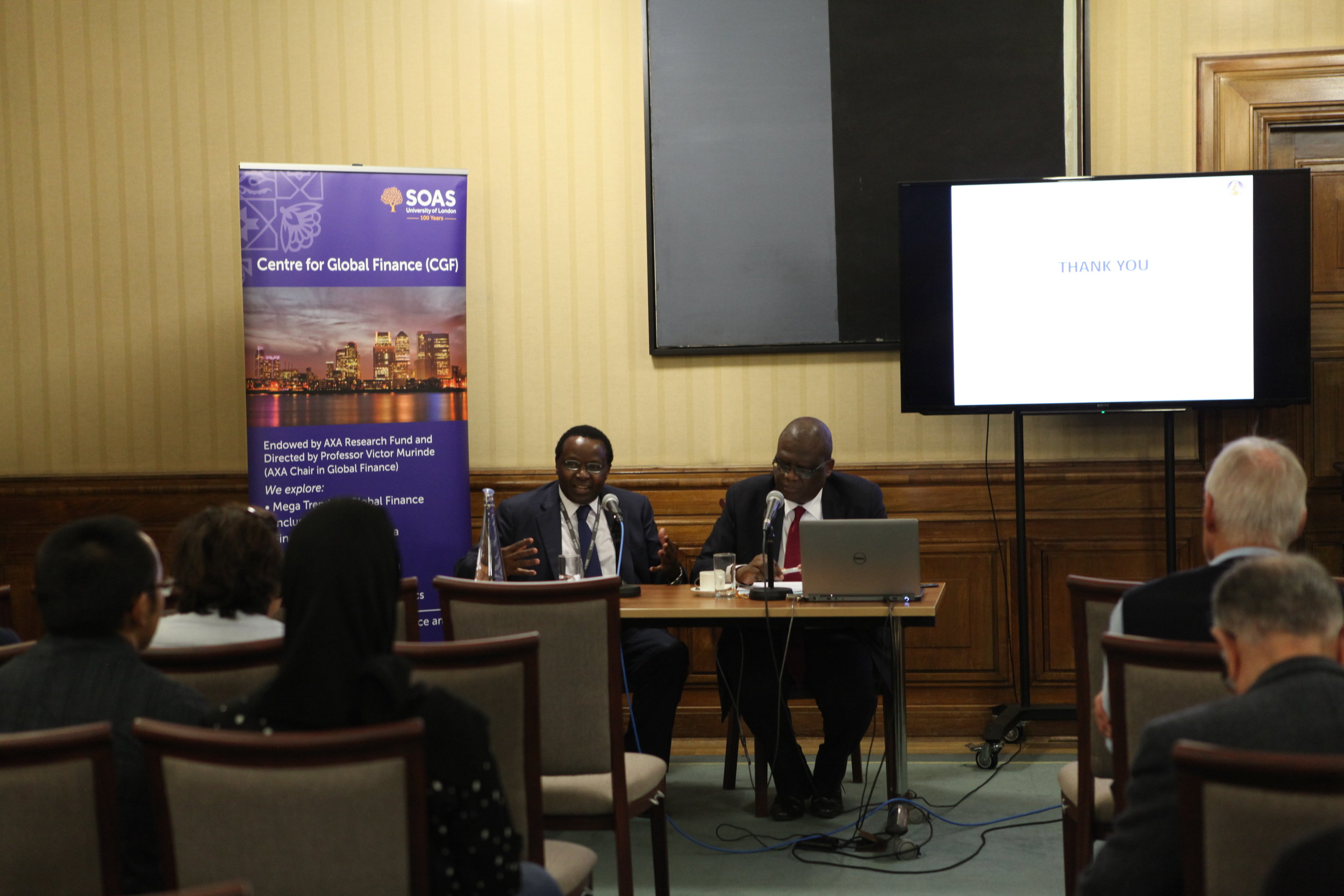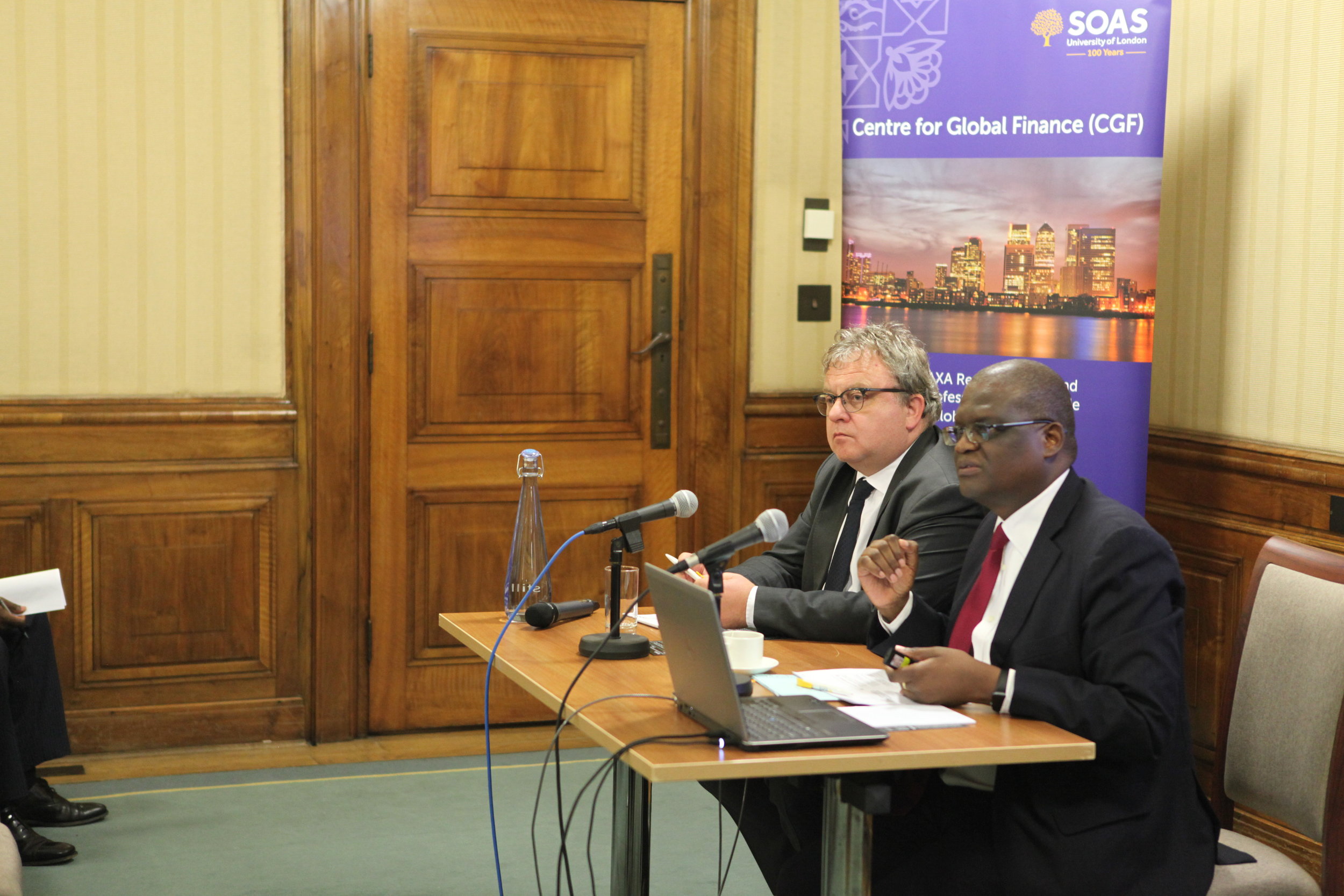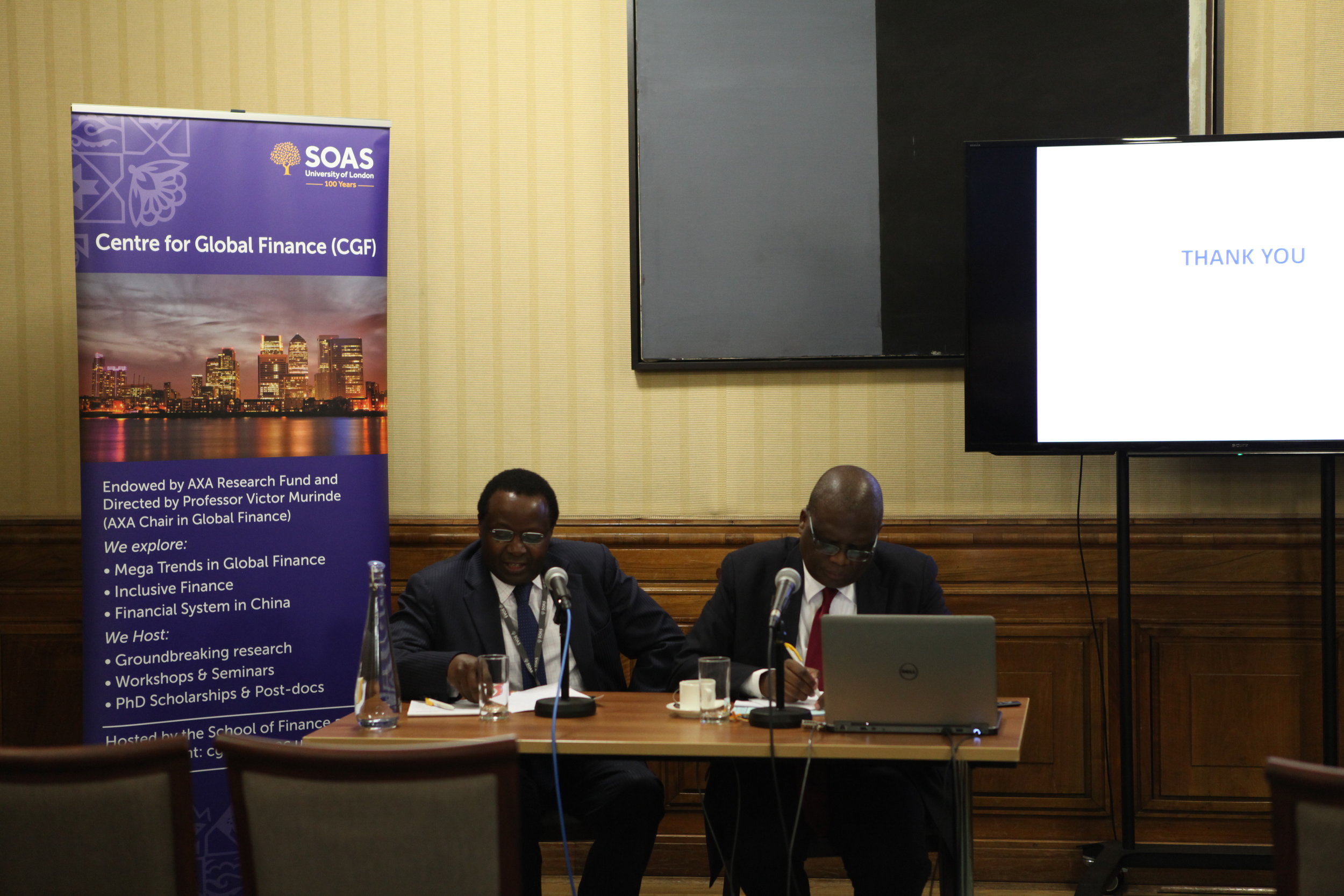Distinguished Guest Lectures
The Drive Towards Building a Digital Economy in Ghana
By H.E. Dr Mahamudu Bawumia
Vice-President of the Republic of Ghana
Monday, 22 October 2018, 18:00-20:00
Chancellor’s Hall, Senate House
University of London, WC1E 7HU
Ghana is at the forefront of building a digital economy, where transactions by government departments are based on digital computing technologies and private sector companies are conducting business through markets on www - the internet. The economy is growing fast (real economic growth rate is at 8.5%). Financial technologies (fintech) are transforming banking and related financial services. But, how did it all start? How do the success stories compare to the impediments, so far? What does the future hold for companies investing in Ghana? Will going digital deliver better livelihoods?
Speaking on the topic “The Drive Towards Building a Digital Economy”, Vice President Bawumia explained the current macroeconomic achievements, for example, economic growth has risen from 3.7% to 8.5% and inflation has fallen from 15.4% to 9.8% in the last 21 months.
Dr Bawumia outlined the need for Ghana to rapidly formalise her economy, the Nana Akufo-Addo Government’s resolve to leverage technology to achieve the formalisation agenda, the successes chalked so far, and the way forward.
“Nearly 61 years ago we gained independence and inherited an economy that pointed us in one direction: extract your natural resources and export them to the rest of the world; import what you don’t have through trade and you may rely on external development assistance to fill your development gaps. (But) This paradigm has not served us well. Our economy remains colonial, highly informal, undiversified, weak, vulnerable, and lacks the internal capability to renew itself, create jobs and spur innovation. We needed to change course,” Dr Bawumia pointed out.
“We have learnt from our past and have taken lessons from other economies. Sustained and high growth economies have absorbed know-how, technology and knowledge from the rest of the world. We must maximise knowledge diffusion to accelerate our progress in development. Therefore, we have resorted to the use of technological innovations to address some of our structural and institutional weaknesses. That is the surest way to leapfrog change,” the Vice President indicated.
Speaking after the Vice President’s lecture, Professor Victor Murinde - the Director of the Centre for Global Finance and the AXA Chair in Global Finance at SOAS University of London, with more than 25 years’ expertise, with senior-level stints at practitioner, policy and consultancy roles for governments and leading international organisations, urged the Ghana government to stay on, and accelerate the pace of the digitisation agenda to help rapidly formalise the economy. Prof Murinde has described Ghana’s ongoing efforts to create a digital, formalised economy as a “timely step in the right direction.”
Prof Murinde said the decision by the Nana Akufo-Addo government to adopt technology in its bid to formalise the Ghanaian economy is very laudable and shows that “Ghana is on the right path.”
Ghana’s “trailblazing” role in the African digitisation agenda is also commendable, Prof Murinde indicated and urged other African countries to emulate Ghana’s example and move in the direction of digitisation in order to take their rightful place in the ever-evolving world economy.
This event is also featured in the online portal of the biggest newspaper in Ghana (Graphic Online):
https://www.graphic.com.gh/news/general-news/ghana-is-on-the-right-path-uk-s-soas-director.html
(left to right): Prof Christine Oughton, Prof Victor Murinde, H.E. Dr Mahamudu Bawumia, Prof Andrea Cornwall
Interview with H.E. Dr Mahamudu Bawumia by Dr Ayse Demir, Centre for Global Finance, SOAS University of London.
Ayse Demir: Do you think that Ghana’s transition to a digital economy will contribute to reducing gender inequalities?
H.E. Dr Mahamudu Bawumia: One of the goals of the digitalisation agenda is to close the gender gap. For example, through land digitisation we gave land titles to women. We targeted to close gender gap through providing equal opportunities in health care and education system. Through financial inclusion, we try to enable participation of women in the financial sector.
Ayse Demir: Have you implemented or do you plan to implement any policies to promote financial literacy that aims to increase public awareness of the digital economy?
H.E. Dr Mahamudu Bawumia: Yes, we conducted campaigns prior to the implementation of such digital transformations. For example, campaigns to explain why Ghanaian should have national ID or what are the benefits of having a national ID.
Ayse Demir: What are the further supervisory and regulatory transformations that you have planned to keep this development sustainable?
H.E. Dr Mahamudu Bawumia: Land digitization, mobile money payments and national IDs are sustainable. We established regulatory bodies such as National Identification Authority to regulate national id services, Central Bank regulations on the mobile money services and again regulatory frameworks to control land digitization to ensure that these policies are sustainable.
Central banking in a dollarised environment: Insights from Zimbabwe
By Dr Kupukile Mlambo
Deputy Governor, Reserve Bank of Zimbabwe
Tuesday, 9 October 2018, 18:00-20:00
Court Room, Senate House
University of London, WC1E 7HU
The conventional experience today is that each sovereign country has a central bank that issues the national currency. But, history has shown that under extraordinary circumstances, some countries have departed from the convention in a number of ways, including the special case where the central bank of a sovereign state (other than the US) adopts the US Dollar as the national currency - so called dollarisation.
But how does dollarisation really work?
Dr Kupukile Mlambo, the Deputy Governor of the Reserve Bank of Zimbabwe (the central bank) shared with us his insights about dollarisation in Zimbabwe. The lecture discussed the historical as well as the current development of dollarisation in Zimbabwe. It shed light on its benefits, the costs associated with the process, the main challenges, the policy responses and the way forward.
Dr. Mlambo argued that dollarisation in Zimbabwe took the form of multi-currency regime, where several foreign currencies have a legal tender status in the country. This change of currency has been beneficial for the country in the short-run, but has brought challenges for monetary policy.










